- News
- Reviews
- Bikes
- Accessories
- Accessories - misc
- Computer mounts
- Bags
- Bar ends
- Bike bags & cases
- Bottle cages
- Bottles
- Cameras
- Car racks
- Child seats
- Computers
- Glasses
- GPS units
- Helmets
- Lights - front
- Lights - rear
- Lights - sets
- Locks
- Mirrors
- Mudguards
- Racks
- Pumps & CO2 inflators
- Puncture kits
- Reflectives
- Smart watches
- Stands and racks
- Trailers
- Clothing
- Components
- Bar tape & grips
- Bottom brackets
- Brake & gear cables
- Brake & STI levers
- Brake pads & spares
- Brakes
- Cassettes & freewheels
- Chains
- Chainsets & chainrings
- Derailleurs - front
- Derailleurs - rear
- Forks
- Gear levers & shifters
- Groupsets
- Handlebars & extensions
- Headsets
- Hubs
- Inner tubes
- Pedals
- Quick releases & skewers
- Saddles
- Seatposts
- Stems
- Wheels
- Tyres
- Health, fitness and nutrition
- Tools and workshop
- Miscellaneous
- Cross country mountain bikes
- Tubeless valves
- Buyers Guides
- Features
- Forum
- Recommends
- Podcast
review
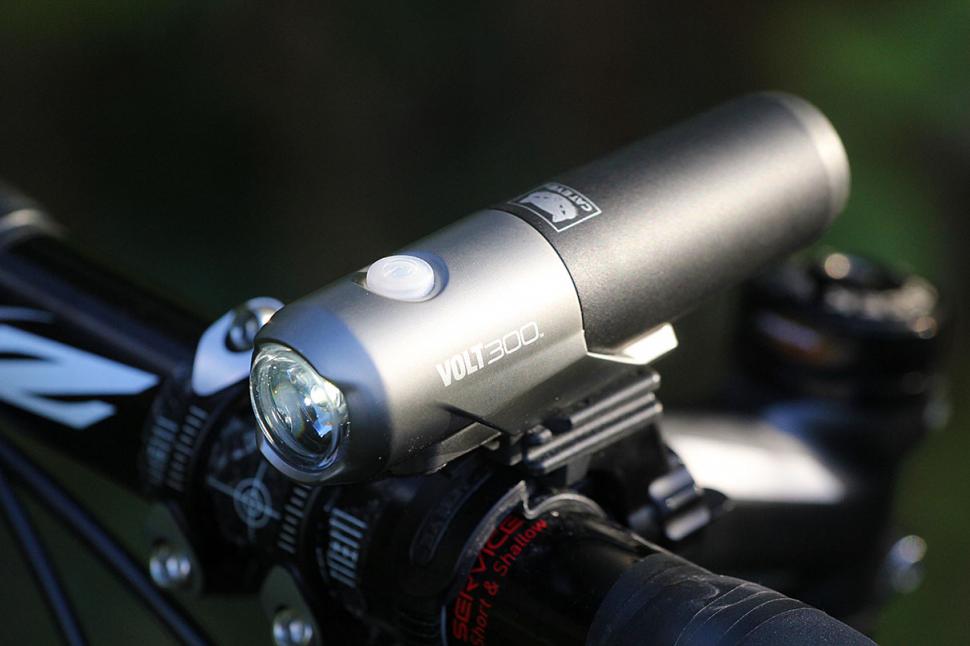 Cateye Volt 300
Cateye Volt 300£49.99
VERDICT:
Excellent choice for commuters, with just about enough power for longer forays
Weight:
134g
Contact:
www.zyro.co.uk
At road.cc every product is thoroughly tested for as long as it takes to get a proper insight into how well it works. Our reviewers are experienced cyclists that we trust to be objective. While we strive to ensure that opinions expressed are backed up by facts, reviews are by their nature an informed opinion, not a definitive verdict. We don't intentionally try to break anything (except locks) but we do try to look for weak points in any design. The overall score is not just an average of the other scores: it reflects both a product's function and value – with value determined by how a product compares with items of similar spec, quality, and price.
What the road.cc scores meanGood scores are more common than bad, because fortunately good products are more common than bad.
- Exceptional
- Excellent
- Very Good
- Good
- Quite good
- Average
- Not so good
- Poor
- Bad
- Appalling
The Cateye Volt 300 is a really good single-LED light at a decent price. It has ample light output for riding around town and even some longer forays into the depths of countryside darkness. It's pretty light and yet built with the solidity that we expect from Cateye; you won't be worried about dropping it.
An unusual feature is the swappable battery cartridge. The whole back half of the light unscrews from the front and can be replaced with another battery (not included). This makes it a great choice for weekends away or long audaxes. You can buy a second battery for £20, but a better option (if you need longer autonomy) is to buy the light complete with the options kit which includes a spare battery, charging dock, helmet mount and charger cable. You can find this for about £60. Spare batteries are supplied with a plastic cap to avoid electrical shorting.
Having recently reviewed the more expensive LUU Pico380, it was interesting to compare it with this compact light from Cateye. The Volt 300 is a similar size, slightly longer and slimmer than the LUU. With a claimed 300 lumens, the Cateye is also just into the territory of lights which are bright enough to see by with no other illumination. When riding dark roads that I knew well in the dry, I was comfortable at speeds of 30mph or so. On wet, unlit, unfamiliar roads with rain-lashed eyewear, I'd want more light for going quickly.
Dave reviewed the big brother Volt 1200 recently and liked it a lot. The beam comparisons are interesting (see our patented comparison engine below), as the Volt 1200 throws out a really wide beam which - to my mind - makes it great for off-road but less good for road riding. I've come to prefer narrower beams on the road, lighting up the bits I need to see without annoying other road users.
Around town the Volt 300 is a great option. There are four main modes which you scroll through by clicking the button: high, medium, low and hyper-constant. Hyper-constant has a continuous low-power illumination punctuated by much brighter flashes and works really well to ensure other road-users have spotted you. Double-click the button and you have a conventional flash mode (with just one speed). This uses less power than hyper-constant but in my experience it's not as visible in day-light either. Pleasingly, the Volt remembers which mode you were using when you power it on next time. Battery life is rated at three hours on high, increasing to as much as 60 hours on flash.
Inevitably real-world usage tends to be a mixture of modes, but the battery life seemed to match up to what was claimed. The power button illuminates when you've got 20% or less juice left. When the warning light came on, I found there was still plenty of time to get home (nearly an hour on full power, in fact). Some (generally more expensive) lights give you a multi-stage battery life indicator, rather than just warning you when it's getting low. However as long as you've got enough time left to get home once you have the warning, as here, I think this works fine.
Charging is via the increasingly ubiquitous micro USB connector, so almost any phone charger will do the trick. Cateye claim six hours charge time from empty, less if you use a mains USB charger rather than a PC port. The connector is located underneath the light, under a decent rubber bung. It's a good location, tucked away and protected from knocks and the elements.
A good bracket is a must for me to like a bike light. Unending battery life and huge illumination are as nothing if I get annoyed every time I put it on a bike. Cateye's Flex Tight bracket is a simple, well-proven and tool-free design and it's about perfect. It takes only a few seconds to put it on a bike, the quick-release is solid and reliable, there's no need for shims (which always get lost) if you want to put it on a 1in handlebar. You can also adjust the angle of the light one-handed while riding, just by slackening off the screw collar a little. Those with more than one bike may buy a bracket for each one, but even with only one bracket, it is really easy to move it from one bike to another.
Returning to the power button, atop the light, I did occasionally wish for an indicator that the light was on. Whereas some lights illuminate the power switch (often too brightly,so it etches patterns into your retinas as you ride) the Volt's power switch only lights up when the battery's dying. It's not a big deal; a quick wave of the hand in front is enough to see whether or not you remembered to switch it on.
The shape, relatively narrow beam and absence of weight make the Volt a good choice for a helmet light. As above, you can buy it with an options kit including a helmet mount for a small premium, but the helmet mount can also be had on its own for about a tenner.
The lens is hooded at the top and at the bottom. I don't think this has a noticeable effect on overall beam shape, but it does help prevent you being blinded when riding out of the saddle. Side visibility is also helped - I'd rate it as reasonable rather than great, in that respect though.
One final point: the Volt 300 does tend to interfere with wireless cycle computers, even Cateye ones. It's the smallest light where I've had this problem; the manual recommends a minimum distance between light and computer.
Verdict
An excellent choice for commuters, with just about enough power for longer forays. Cartridge battery could be popular with any audaxers not running dynamos.
The light comparator
If you have a nice big screen you can click here for the widescreen version (1400x1000px)
road.cc test report
Make and model: Cateye Volt 300
Size tested: Black, Front light
Tell us what the light is for, and who it's aimed at. What do the manufacturers say about it? How does that compare to your own feelings about it?
The Volt300 is a USB rechargeable headlight that features quick-change cartridge battery and 300 lumen output in compact design. This light features five modes: High, Normal, Low, Hyper Constant and Flashing. The Volt300 can be mounted on or under the handlebars or on the helmet. Spare cartridge batteries, ideal for long rides and commuting, and charging cradle are available as add-on parts and can be changed safely and easily without any additional tools.
Tell us some more about the technical aspects of the light?
Dimension: 111.5 x 31.0 x 38.0 mm
Weight: 120 grams (light unit and battery)
Light source: High intensity white LED X1
Light output: 300lm
Run time:
High mode: approx 3hrs
Normal mode: approx 8hrs
Low mode: approx 18hrs
Hyper Constant mode: approx 11hrs
Flashing mode:
approx 60hrs
Battery:
Li-ion rechargeable battery (3.7V-2200mAh)
Recharge time: approx 6 hrs (USB2.0 recharge), 3 hrs via optional fast-charging cradle
Recharge/discharge number of times: about 300 times(until the rated capacity drops to 70%)
Other: Low battery indicator, lighting mode memory function. Helmet mount (optional)
Rate the light for quality of construction:
9/10
Solidly built yet not heavy - really good.
Rate the light for design and ease of use. How simple was the light to use?
8/10
Well thought-through design, one-button operation is simple. Double-click for flash is unusual, but not that hard to get used to.
Rate the light for the design and usability of the clamping system/s
10/10
Simple, lightweight and cheap. It works really well, is quick to fit and easy to adjust, all without tools. Basically about as close to perfect as I've yet seen.
Rate the light for waterproofing. How did it stand up to the elements?
9/10
No issues during the (very wet) test period.
Rate the light for battery life. How long did it last? How long did it take to recharge?
8/10
Given the lack of weight and reasonably powerful output, battery life is very respectable.
Rate the light for performance:
8/10
Relatively narrow beam works well on the road - wouldn't be much use off it. Just about perfect as a commuter, and on a dry night is enough to see by further afield.
Rate the light for durability:
9/10
In my experience Cateye stuff is really reliable. No issues during test and I'd expect this to last for a good while. When the battery eventually wears out, you can just get another one.
Rate the light for weight, if applicable:
9/10
Rate the light for value:
8/10
Price is more than fair; most lights with similar output on our big test were more expensive.
Tell us what you particularly liked about the light
Light weight and how easy it is to switch from one bike to another. Reasonable battery life and plenty of warning when it's getting low.
Tell us what you particularly disliked about the light
Not much. For serious dark-night riding, I would want few more lumens
Did you enjoy using the light? Yes.
Would you consider buying the light? Yes.
Would you recommend the light to a friend? Yes.
About the tester
Age: 35 Height: 6 Weight: 78kg
I usually ride: Boardman CX team for the daily commute My best bike is: Rose Xeon CRS
I've been riding for: Over 20 years I ride: Most days I would class myself as: Expert
I regularly do the following types of riding: road racing, time trialling, commuting, touring, club rides, sportives, general fitness riding, fixed/singlespeed, mtb,
Jez spends his days making robots that drive cars but is happiest when on two wheels. His roots are in mountain biking but he spends more time nowadays on the road, occasionally racing but more often just riding.
Latest Comments
- chrisonabike 4 hours 43 min ago
I don't have them to hand but IIRC Dutch cycling figures and some slicing and dicing plus analysis are available. Like our own figures it's worth...
- whosatthewheel 5 hours 4 min ago
It's not only you. The problem with the sort of rural shared paths as pictured is that dog owners bring their dogs there precisely to be able to...
- brooksby 5 hours 15 min ago
True. Except that the UberdeliverJust Eat riders *arent* employees. Just independent contractors who happen to be on call to JystDeliverUberEat...
- Steve K 5 hours 21 min ago
You may not be the first person to have made that joke 😀 (But, yes, she is.)
- Smoggysteve 5 hours 22 min ago
No, it's not. I can look at Garmin, I can look at what Garmin says on tbe Garmin app along side weighted average. And I can see what Strava says...
- Bright Strider 5 hours 44 min ago
The cyclops junctions in Cambridge work well. ...
- David9694 6 hours 38 min ago
Teen boy arrested after flipping car in countryside near Swindon...
- gucci_slipperz_ 7 hours 43 min ago
I would be curious to see how these compare to the Elite Wheels lineup. Currently I have some LB wheels but was looking into other options for fun...
- Eton Rifle 8 hours 21 min ago
McDonald's and an Uber. Sorted.
- David9694 10 hours 39 min ago
imagine deciding to put all this energy into trying to shunt a problem around without any prospect of solving it. ...
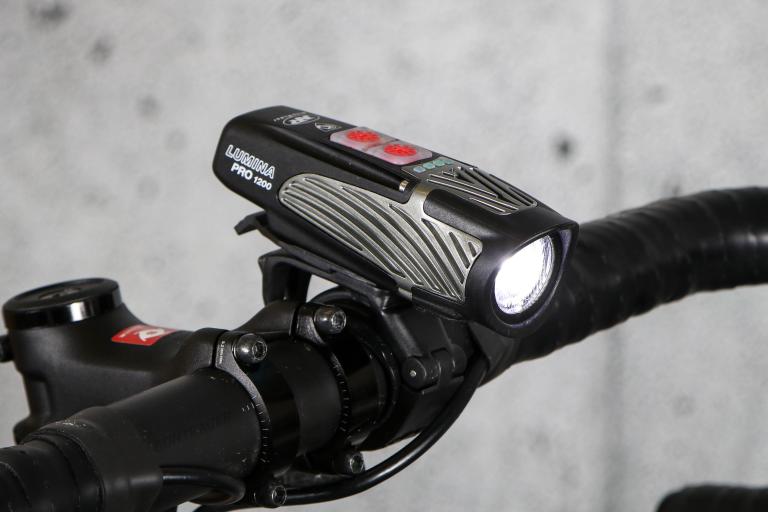
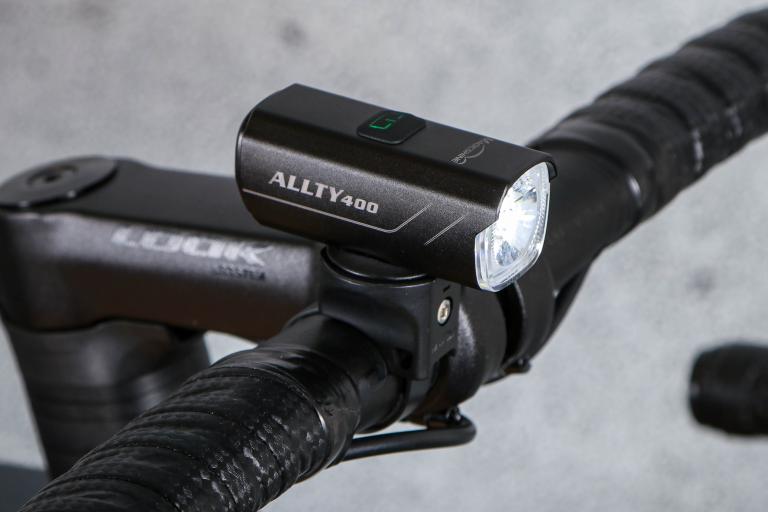
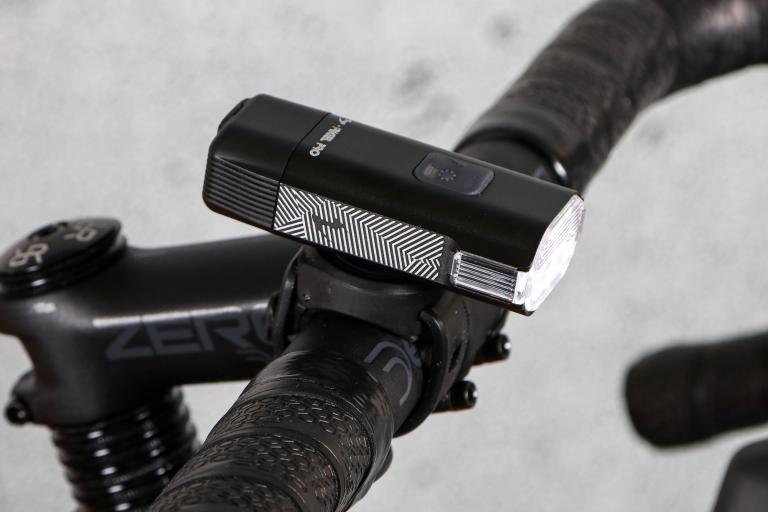
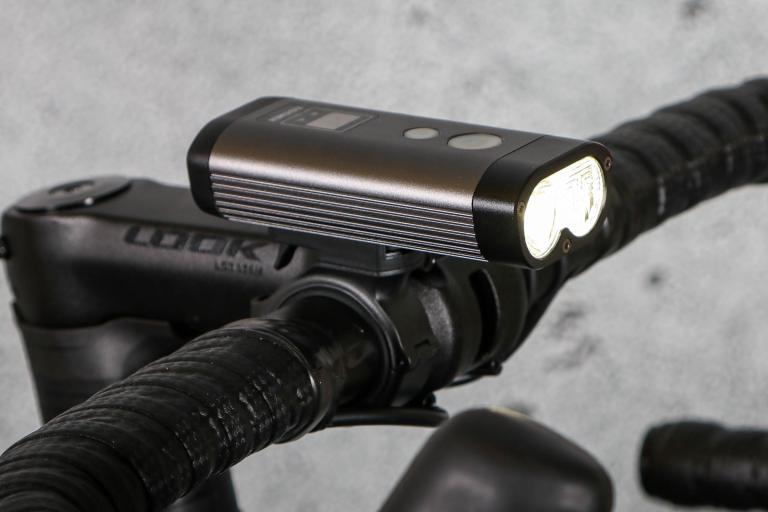
Add new comment
15 comments
Annoying that the Volt 300 isn't on the comparison tool. Not sure what use looking at the 1200 is?!
I've had this for over a year and it's only after stumbling across this review that I found out you can unscrew the battery!
Great light though, no complaints, solid visibility.
Got one of these, they are excellent and they also look as elegant as a front light is able to.
The battery is interchangeable with the Volt50 rear (red) light as is the charger. I've got a spare battery in case the front or rear light goes and a Powerrocks (TM?) to charge either
Being USB I charge them at work TeeHee,...
Thanks for taking the time to update us.
Mine's been sat in the drawer since the clocks changed, with just the emergency lights in the bag ready for when it's really gloomy out, but will definitely double-check everything before I start using it again.
Shame nothing was said about the reason for the failure of the first one though.
The replacement light has had no issues with charging after 4 months of use. Never heard anything back from the distributor about the cause of fault in the first review item.
Don't click [buy] just yet ... my review unit now won't charge. Tried multiple chargers and nothing happens.
It's been out in some pretty atrocious weather but there's no sign of water ingress.
Watch this space....
EDIT: replacement light received today. Original has been returned to the distributor for investigation. We'll see how this one fares and update in due course.
Bought one of these before Christmas and its been a great investment, if anybody is interested I reviewed it on the Cycle Chat Forum. http://www.cyclechat.net/threads/cateye-volt-300.144917/
I don't have this, but I see having a cable as preferable to directly plugging something into a USB port as it gives more flexibility in placement (cables are cheap so you easily have one at work and one at home if you want), and having the same battery front and back is a nice touch as you can swap them around if you ever mess up and find yourself out of light at the front (a weak battery may well be able to drive a pulsing-light at the rear too). All seems sensible to me.
No doubt a model or two between this 300 and the rather more powerful 1200 will be along at some point, which would be nice.
Agree with the reviews and comments, it is very impressive. It would work easily as a single light on dual flash/steady mode & it strobes road signs and number plates way into the distance for grabbing a drivers attention.
To use as a to see by light in otherwise total darkness you need to be on the solid beam full power setting, but when you are it is remarkably impressive for a light at this price and size. I was happy & completely confident riding at 90+% my usual pace (~15 mph on Brompton) in pitch dark country parkland trails and on completely unlit countryside roads.
Highly recommended light.
I was trying to decide between this and the nano shot+ and ended up going with the more expensive nano+ as my riding is on unlit roads in the middle of nowhere. Although I really like the power of the nano shot+ I often think this would have been a better option because of the battery life (and option to carry a spare), meaning there's a whole lot less charging going on. I'm sure the light output would be perfectly adequate, especially once your eyes become adjusted to the dark, and it is smaller too.
Got one of these, think it's a really good light for the price.
Another option, you can get this light and the Volt 50 rear light as a set (for around £80). As I understand it they use the same battery (but the rear light lasts much longer with 1/6th of the brightness). Cateye claim that you can then extend the run time by 50% by swapping the batteries around when the front light begins to get low.
That’s such a good idea, why did it never catch on? Could imagine it being very useful.
Is the Knog PWR an improved version of this idea?
Been commuting with one of these for a few weeks now and fully agree with the reviewer's comments.
It's a quality piece of kit with a decent beam pattern for on-road riding and plenty of light both to see and be seen with (hyper-constant mode is awesome!).
Takes next to no time to switch between bikes and will recharge in about 3 hours with an iPhone charger.
I picked one up for a little over £35 delivered from Amazon, which was an absolute bargain. Yes, you could get a vastly more powerful eBay special for less, but the Cateye is proof indeed that its simply not about ultimate lumen output when it comes to urban riding.
Highly recommended.
Not an excellent choice if you are a commuter and meet someone with one of these lights coming towards you. May be legal for road use, but definitely not suitable without beam cut-off feature.